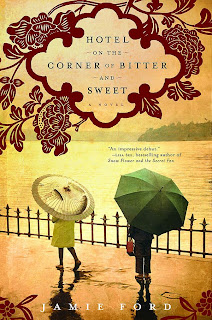STATUS: Doesn’t feel like TGIF because I have to work this weekend to be ready to leave town next Wed. for Maui Writers Conference. Yep, I’m grumbling.
That is when HOTEL ON THE CORNER OF BITTER AND SWEET will release. Click here to pre-order (all of you who have been dying for this title’s release).
And just look at this gorgeous cover.
.jpg)
Hardcover Flap Copy:
In the opening pages of Jamie Ford’s stunning debut novel, Hotel on the Corner of Bitter and Sweet, Henry Lee comes upon a crowd gathered outside the Panama Hotel, once the gateway to Seattle’s Japantown. It has been boarded up for decades, but now there is activity and life—a new owner has made an incredible discovery: the belongings of Japanese families, left when they were rounded up and sent to internment camps during World War II. As Henry looks on, the owner opens a Japanese parasol.
The act takes old Henry Lee back to the 1940s, at the height of the war, when young Henry Lee’s world is a jumble of confusion and excitement—his father is obsessed with the war in China and having Henry grow up American. While “scholarshipping” at the exclusive Ranier Academy, where the white kids ignore him, Henry meets Keiko Okabe, a young Japanese-American student. Amid the chaos of blackouts, curfews, and FBI raids, Henry and Keiko forge a bond of friendship—and innocent love—that transcends the long-standing prejudices of their Old World ancestors. And after Keiko and her family are swept up in the evacuations to the internment camps, she and Henry hold on to hope—that the war will end, that their promise to each other will be kept.
Forty years later, Henry Lee is certain that the parasol belonged to Keiko. In the dark dusty basement he begins looking for signs of the Okabe family’s belongings and a long-lost object whose value he cannot begin to describe. Now a widower, Henry is still trying to find his voice—words that might explain the actions of his nationalistic father; words that might bridge the gap between him and his modern, Chinese American son; words that might help him confront the choices he made many years ago.
Set during one of the most conflicted and volatile times in American history, Hotel on the Corner of Bitter and Sweet is an extraordinary story of commitment and enduring hope set against the racism and misunderstandings that arise between different cultures and generations. In Henry and Keiko, Jamie Ford has created an unforgettable duo whose story teaches us of the power of forgiveness and the human heart.
I also have a favor. Earlier this week, somebody from the Book Group Expo left a comment saying they had read an ARE (which was super exciting) but because it was linked to some earlier entry relating to Jamie, I can’t find it now. If you are that Book Group Expo person, please post again as it was a lovely comment and Jamie and I want to show some BGE appreciation!



.jpg)